
Prikladnaya Diskretnaya Matematika
Scope & Guideline
Connecting Scholars with Cutting-Edge Computational Insights.
Introduction
Aims and Scopes
- Cryptography and Security:
The journal extensively covers cryptographic methods, including the construction and analysis of cryptographic algorithms, zero-knowledge proofs, and security protocols. It addresses both theoretical aspects and applications in securing information and communication. - Combinatorial Optimization:
Research on combinatorial problems, such as the bounded knapsack problem and graph clustering, is a significant focus. The journal publishes studies that explore new algorithms and optimization techniques for solving complex combinatorial challenges. - Graph Theory and Network Analysis:
Many papers delve into graph theory, particularly concerning properties of graphs, dynamic systems of graph orientations, and algorithms for network problems. This area includes the exploration of graph structures and their applications in various fields. - Error-Correcting Codes and Information Theory:
The journal features research on algebraic-geometric codes, error-correcting pairs, and the complexity of coding systems. This reflects an ongoing interest in enhancing data integrity and communication reliability through advanced coding techniques. - Complexity Theory:
Theoretical explorations into the complexity of various mathematical problems, including undecidable problems and the complexity of algorithms, are prevalent. This area contributes to understanding the limits of computation and problem-solving.
Trending and Emerging
- Advanced Cryptographic Techniques:
There is a notable increase in research focusing on innovative cryptographic algorithms, including those utilizing new mathematical constructs and security models. This trend is crucial due to the growing importance of cybersecurity in the digital age. - Integration of Machine Learning with Discrete Mathematics:
Emerging studies are beginning to explore the intersection of machine learning methodologies with discrete mathematics, particularly in anomaly detection and optimization problems. This reflects a broader trend in leveraging computational intelligence to solve complex mathematical problems. - Algorithmic Efficiency and Complexity Reduction:
Research that emphasizes improving the efficiency of algorithms for solving discrete mathematical problems is on the rise. This includes heuristic approaches and new algorithmic strategies that aim to reduce complexity in various applications. - Dynamic Systems and Their Mathematical Modeling:
Recent papers have shown an increased interest in the mathematical modeling of dynamic systems, particularly using graph orientations. This trend is relevant for applications in network theory and systems analysis. - Applications of Algebraic Structures in Coding Theory:
There is a growing focus on the application of advanced algebraic structures to improve error-correcting codes and cryptographic systems, indicating a trend towards utilizing theoretical advancements for practical applications.
Declining or Waning
- Historical Studies in Cryptography:
Papers focusing on historical analyses of cryptographic protocols and their development have become less frequent. This suggests a shift towards contemporary applications and innovations in cryptography rather than retrospective studies. - Classical Graph Theory:
Research specifically dedicated to classical aspects of graph theory without direct applications to modern technologies has seen a decrease. The trend indicates a preference for applied graph theory related to computational problems and network analysis. - Basic Theoretical Constructs in Algebra:
While algebra remains a key area, studies focusing on basic theoretical constructs without practical applications are less common. The emphasis appears to have moved towards applied algebraic methods, particularly in cryptography and coding theory.
Similar Journals

DISCRETE APPLIED MATHEMATICS
Advancing the Boundaries of Discrete Mathematics.DISCRETE APPLIED MATHEMATICS, published by ELSEVIER, is a premier journal dedicated to advancing the fields of Applied Mathematics, particularly focusing on Discrete Mathematics and Combinatorics. Since its inception in 1979, the journal has established itself as a vital resource for researchers and practitioners alike, achieving a commendable Q2 ranking in both applied and discrete mathematics categories as of 2023. With an ISSN of 0166-218X and an E-ISSN of 1872-6771, the journal serves an international audience by disseminating significant findings and fostering innovation in mathematical applications. Its Scopus ranking positions it notably within the top tier, ranking #23 out of 92 in Discrete Mathematics and Combinatorics, highlighting its impact in the academic community. Although the journal is not open access, it remains accessible through institutional subscriptions. Researchers, professionals, and students are encouraged to engage with the relevant and rigorous research published in this esteemed journal, as it plays a crucial role in shaping the future of mathematical sciences.

International Journal of Mathematics and Computer Science
Elevating Knowledge in Applied and Theoretical MathematicsThe International Journal of Mathematics and Computer Science (ISSN: 1814-0424, E-ISSN: 1814-0432), published by Lebanese University, serves as a vital platform for disseminating innovative research and advancements in the fields of mathematics and computer science. With a compelling range of topics including Algebra, Applied Mathematics, Computational Mathematics, and Statistical Analysis, this journal caters to a broad audience of researchers, professionals, and students. Spanning the years from 2017 to 2025, it has established a presence in several key quartiles, including Q3 rankings in Applied Mathematics and Computational Mathematics, and a Q4 ranking in Algebra and Number Theory. While currently not an open-access journal, it provides valuable insights through its rigorous peer-reviewed process, enhancing its relevance in both theoretical and applied domains. Furthermore, its presence in Scopus rankings reflects its commitment to quality, making it an essential resource for anyone looking to explore the intersection of mathematics and computer science.
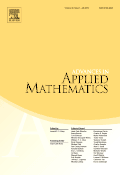
ADVANCES IN APPLIED MATHEMATICS
Empowering Real-World Solutions Through MathematicsADVANCES IN APPLIED MATHEMATICS, published by ACADEMIC PRESS INC ELSEVIER SCIENCE, is a prestigious journal that has served the mathematical community since 1980. With its ISSN 0196-8858 and E-ISSN 1090-2074, the journal is based in the United States, specifically in San Diego, CA. As a leading periodical in the field, it holds a notable Q2 ranking in Applied Mathematics and has been consistently ranked in the 43rd percentile among similar journals, illustrating its relevance and impact within the discipline. Although not an Open Access journal, ADVANCES IN APPLIED MATHEMATICS plays a crucial role in disseminating significant research findings, theoretical studies, and innovative applications of mathematics that address real-world problems. Researchers, professionals, and students alike will find valuable insights in its carefully curated publications, making it an essential resource for those looking to advance their understanding and application of mathematics.
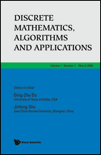
Discrete Mathematics Algorithms and Applications
Connecting Theory and Practice in Discrete Mathematics.Discrete Mathematics Algorithms and Applications, published by World Scientific Publishing Co Pte Ltd, stands as a pivotal resource in the field of discrete mathematics and combinatorics since its inception in 2009, with a convergence period extending to 2024. The journal holds an esteemed position within its category, ranked in the Q3 quartile according to latest metrics, recognized for its qualitative contributions to the academic community. With an ISSN of 1793-8309 and an E-ISSN of 1793-8317, it serves as a vital conduit for disseminating innovative research focused on algorithms and their applications within discrete mathematics. Although currently not an open access journal, it provides access to valuable insights and findings that are crucial for researchers, professionals, and students seeking to advance their understanding and application of discrete mathematical concepts. Based in Singapore, the journal continues to promote rigorous scholarly discourse and is a key publication for those involved in advancing the discipline.
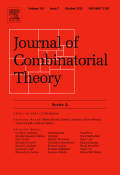
JOURNAL OF COMBINATORIAL THEORY SERIES A
Fostering Breakthroughs in Computational Inquiry.JOURNAL OF COMBINATORIAL THEORY SERIES A, published by Academic Press Inc. Elsevier Science, stands as a pivotal platform for researchers in the realm of combinatorial mathematics and theoretical computer science. With an impact factor that underscores its influence and a well-respected reputation reflected in its rapid ascent to Q1 rankings in discrete mathematics and computational theory, this journal serves as a critical resource for academics seeking to advance their understanding of complex combinatorial structures and algorithms.
Founded in 1971, the journal covers a wide spectrum of topics within combinatorial theory, providing a robust forum for innovative research and theoretical advancements until 2025. Including a strong position in the Scopus rankings—notably, it ranks #10 out of 92 in discrete mathematics—the journal is essential for both emerging scholars and established professionals committed to pushing the boundaries of mathematical and computational inquiry. Researchers are encouraged to submit their findings to this esteemed publication, as it offers a non-open-access model that ensures rigorous peer review and high visibility within the academic community.

Advances and Applications in Discrete Mathematics
Fostering Collaboration through Discrete Mathematics ResearchAdvances and Applications in Discrete Mathematics, published by PUSHPA PUBLISHING HOUSE, is a premier journal dedicated to the flourishing field of discrete mathematics. With a focus on both the theoretical aspects and practical applications, this journal serves as a valuable resource for researchers, professionals, and students aiming to explore cutting-edge developments in areas such as combinatorics, graph theory, and algorithms. Although specific impact factors have yet to be established, its commitment to quality scholarship is reflected in its rigorous peer-review process, ensuring that published articles meet high academic standards. The journal encourages open access to disseminate knowledge effectively, fostering collaboration and innovation within the discrete mathematics community. As a vital platform for researchers wishing to contribute to this dynamic field, Advances and Applications in Discrete Mathematics plays a critical role in promoting advancements and applications that are essential to both theoretical exploration and practical problem-solving.
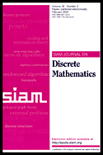
SIAM JOURNAL ON DISCRETE MATHEMATICS
Exploring the depths of combinatorial brilliance.SIAM Journal on Discrete Mathematics is a premier academic journal dedicated to the publication of high-quality research in the field of discrete mathematics. Published by SIAM Publications, this journal features original research articles covering a broad range of topics, including combinatorial optimization, graph theory, and algorithm design. With an impressive impact factor placing it in the top quartile (Q1) of mathematics journals, it is a valuable resource for researchers and practitioners looking to stay abreast of the latest advancements in discrete mathematics. Although currently not open access, the journal commits to disseminating rigorous and impactful findings that advance the understanding of mathematical concepts and their applications in various scientific domains. Renowned for its rigorous peer-review process, the SIAM Journal on Discrete Mathematics serves as an essential platform for scholars aiming to contribute to this evolving field, making it a must-read for anyone involved in mathematical research.
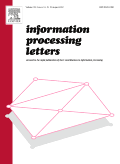
INFORMATION PROCESSING LETTERS
Innovating the Future of Computational ScienceINFORMATION PROCESSING LETTERS, published by ELSEVIER and with an ISSN of 0020-0190, is a prominent academic journal that serves as a vital resource in the fields of Computer Science, Information Systems, and Signal Processing, among others. As evidenced by its Q3 ranking across various categories in 2023, including Computer Science Applications and Theoretical Computer Science, it provides a rigorous platform for the dissemination of innovative research and theoretical developments. Researchers and professionals can delve into a wide array of subjects pertinent to information processing, contributing to advancements in technology and data management. Although it does not offer Open Access options, the journal maintains an influential presence in scholarly discourse, making it a crucial reference for those engaged in computational innovations and system optimizations. With coverage from 1971 to 2025, it continues to be integral for both seasoned academics and emerging scholars.
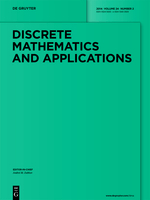
Discrete Mathematics and Applications
Pioneering Research in Discrete and Applied Mathematical Fields.Discrete Mathematics and Applications, published by WALTER DE GRUYTER GMBH, is a vital academic journal catering to the expansive fields of Discrete Mathematics and Applied Mathematics. With an ISSN of 0924-9265 and an E-ISSN of 1569-3929, it serves as a reputable platform for disseminating innovative research and developments within these domains. The journal has been contributing to the academic landscape since its inception in 1991 and continues to actively publish impactful studies through 2024. Despite its current positioning in Q4 of both the Applied Mathematics and Discrete Mathematics and Combinatorics categories, the journal is dedicated to fostering essential discussions that advance understanding and application of discrete mathematical concepts. It provides researchers, professionals, and students with access to a wealth of knowledge, encouraging collaboration and growth within the field. With its strategic German headquarters in Berlin and a focused aim to enhance the visibility and significance of discrete mathematics in real-world applications, Discrete Mathematics and Applications stands out as an important resource for those seeking to contribute to the ongoing evolution of mathematical sciences.

APPLICABLE ALGEBRA IN ENGINEERING COMMUNICATION AND COMPUTING
Innovating Communication and Computing through AlgebraAPPLICABLE ALGEBRA IN ENGINEERING COMMUNICATION AND COMPUTING is a distinguished journal published by Springer, dedicated to advancing the fields of algebra and applied mathematics within engineering contexts. With an ISSN of 0938-1279 and an E-ISSN of 1432-0622, this journal has established itself as an essential resource for researchers, professionals, and students interested in the intersection of algebraic theory and practical applications in communication and computing since its inception in 1990. As of 2023, it holds a commendable Q3 quartile ranking in both Algebra and Number Theory and Applied Mathematics, reflecting its significant contribution to these fields, particularly as it ranks 11th out of 119 in Algebra and Number Theory within Scopus. The journal is committed to publishing high-quality research, case studies, and theoretical advancements that bridge the gap between abstract mathematical concepts and real-world engineering solutions, fostering innovation and knowledge transfer. Despite not being open access, it remains a pivotal platform for disseminating cutting-edge research and is vital for those seeking to deepen their understanding of applicable algebra in a rapidly evolving technological landscape.